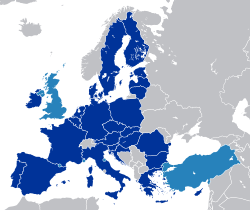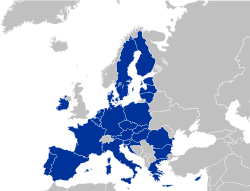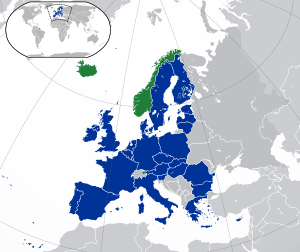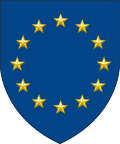European Union Customs Union
The European Union Customs Union (EUCU) is a customs union which consists of all the member states of the European Union (EU), Monaco and – until the end of its Brexit transition period – the United Kingdom and some of its dependencies.[lower-alpha 1] Some detached territories of EU members do not participate in the customs union, usually as a result of their geographic separation.[lower-alpha 2] In addition to the EUCU, the EU is in customs unions with Andorra, San Marino, and Turkey (with the exceptions of certain goods),[lower-alpha 3] through separate bilateral agreements.[2]
European Union Customs Union | |
|---|---|
 Non-EU states which participate in the customs union, or are in bilateral customs unions with the EU | |
| Policy of | |
| Type | Customs union |
| Membership | 27 EU member states
1 state in transitional arrangement
4 states with bilateral agreements
|
| Establishment | 1958 |
| Area | |
• Total | 5,200,000 km2 (2,000,000 sq mi) |
| Population | |
• 2014 estimate | 585,000,000 |
| GDP (PPP) | 2014 estimate |
• Total | $19.6 trillion |
| GDP (nominal) | 2014 estimate |
• Total | $19.2 trillion |
There are no tariffs or non-tariff barriers to trade between members of the customs union and – unlike a free-trade area – members of the customs union impose a common external tariff on all goods entering the union.[3]
The European Commission negotiates for and on behalf of the Union as a whole in international trade deals (such as that with Canada and many others), rather than each member state negotiating individually. It also represents the Union in the World Trade Organization and any trade disputes mediated through it.
During the Brexit transition period the United Kingdom continues to function as a part of the Customs Union. As of February 2020, the United Kingdom's relationship with the European Union after the end of the transition period remains to be negotiated.
Non-EU participants
Monaco, the United Kingdom, and the British dependencies of Akrotiri and Dhekelia, Guernsey, the Isle of Man and Jersey are integral parts of the EU's customs territory.[2]
| State / territory | Agreement | Entry into force | Notes |
|---|---|---|---|
| Franco-Monegasque Customs Convention[4][5] | 1963 | ||
including the |
Agreement on the withdrawal of the United Kingdom of Great Britain and Northern Ireland from the European Union and the European Atomic Energy Community [6] | 1 February 2020 | Ends on 31 December 2020 (by default) |
Bilateral customs unions
Andorra, San Marino and Turkey, a candidate for EU membership, are each in a customs union with the EU.[2]
| State | Agreement | Entry into force | Notes |
|---|---|---|---|
| Agreement in the form of an Exchange of Letters between the European Economic Community and the Principality of Andorra – Joint Declarations[7] | 1 January 1991 | Excludes agricultural produce | |
| Agreement on Cooperation and Customs Union between the European Economic Community and the Republic of San Marino[8] | 1 April 2002 | ||
| Decision No 1/95 of the EC-Turkey Association Council of 22 December 1995 on implementing the final phase of the Customs Union[9] | 31 December 1995 | Excludes agricultural produce | |
EU territories with an opt-out
While all EU member states are part of the customs union, not all of their respective territories participate. Territories of member states which have remained outside of the EU (overseas territories of the European Union) generally do not participate in the customs union.[10]
However, some territories within the EU do not participate in the customs union:
- Büsingen am Hochrhein (a German exclave within Switzerland, part of the Switzerland–Liechtenstein customs area)[11][12]
- Livigno[11][12]
- Ceuta and Melilla (the two Spanish autonomous cities in Africa).[11][12]
The following are not listed in Regulation 952/2013 but may be non-participant in some aspects for other reasons:
Union Customs Code
The Union Customs Code (UCC), intended to modernise customs procedures, entered into force on 1 May 2016.[13] Implementation will take place over a period of time and full implementation is anticipated by 31 December 2020 at the latest.[14] The European Commission has stated that the aims of the UCC are simplicity, service and speed.
Common external tariffs
The EU Customs Union sets the tariff rates for imports to the EU from other countries. These rates are detailed and depend on the specific type of product imported, and can also vary by the time of year.[15] The full WTO Most Favoured Nation tariff rates apply only to those countries that do not have a Free Trade Agreement with the EU, or are not on a WTO recognised exemption scheme such as Everything but Arms (an EU support arrangement for Least Developed Countries).
See also
- European Customs Information Portal
- European Economic Area (EU and EFTA except Switzerland)
- European Free Trade Association (EFTA)
- European integration
- European Single Market
- European Union–Turkey Customs Union
- Free-trade area
- Free trade areas in Europe
- Market access
- Non-tariff barriers to trade
- Rules of origin
- Tariff
Footnotes
- Akrotiri and Dhekelia "is treated as territory of Cyprus for customs, VAT and excise purposes". Guernsey, the Jersey, the Isle of Man and the other British Overseas Territories are not in the customs union.[1]
- For example, the one exclave of Germany within Switzerland.
- See European Union–Turkey Customs Union.
References
- FAQ: Customs, Taxation and Customs Union, European Commission. Retrieved 20 August 2016.
- Customs unions, Taxation and Customs Union, European Commission. Retrieved 20 August 2016.
- Erskine, Daniel H (2006). "The United States-EC Dispute Over Customs Matters: Trade Facilitation, Customs Unions, and the Meaning of WTO Obligations". Florida Journal of International Law. 18: 432–485. SSRN 987367.
- "Taxation and Customs – FAQ". European Commission. Archived from the original on 8 June 2012. Retrieved 12 September 2012.
- "Council Regulation (EEC) No 2913/92 of 12 October 1992 establishing the Community Customs Code". Official Journal of the European Union. 19 October 1992. Retrieved 12 September 2012.
- https://assets.publishing.service.gov.uk/government/uploads/system/uploads/attachment_data/file/862063/TS3202_1.PDF
- "Andorra: Customs Unions and preferential arrangements". European Commission. Archived from the original on 26 October 2012. Retrieved 12 September 2012.
- "Agreement on Cooperation and Customs Union between the European Economic Community and the Republic of San Marino".
- "Decision No 1/95 of the EC-Turkey Association Council of 22 December 1995 on implementing the final phase of the Customs Union" (PDF).
- Territorial status of EU countries and certain territories – European Commission, retrieved 18 December 2018
- Article 6 of Council Directive 2006/112/EC, 28 November 2006
- "REGULATION (EU) No 952/2013 OF THE EUROPEAN PARLIAMENT AND OF THE COUNCIL of 9 October 2013 laying down the Union Customs Code, Article 4" (PDF). EURLEX. October 2013. p. 11. Retrieved 17 December 2018.
- "Union Customs Code – Taxation and customs union – European Commission". Taxation and customs union.
- UCC: an Introduction, accessed 29 January 2017
- Taric and Quota Data & Information – European Commission Communication and Information Resource Centre for Administrations, Businesses and Citizens.
External links
- TARIC database enquiry system, gives current tariff rates applicable by exporting country and season – European Commission: Communication and Information Resource Centre for Administrations, Businesses and Citizens.
- TARIC and Quota Data & Information: user guides for the TARIC database above – European Commission: Communication and Information Resource Centre for Administrations, Businesses and Citizens.
- Turkey border gridlock hints at pain to come for Brexit Britain Financial Times, February 16, 2017




